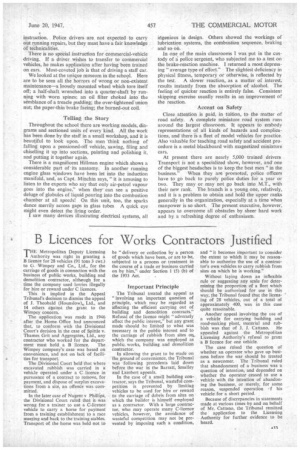B Licences for Works Contractors Justified
Page 43

If you've noticed an error in this article please click here to report it so we can fix it.
be "delivery or collection by a person of goods which have been, or are to be, subjected to a process or treatment in the course of a trade or business carried on by him," under Section 1 (5) (b) of the 1933 Act. THE Metropolitan Deputy Licensing 1 Authority was right in granting a B licence for 28 vehicles (91 tons 3 cwt.) to CI. Wimpey and Co., Ltd., for the carriage of goods in connection with the business of public works, building and demolition contractor, although for a time the company used lorries illegally for hire or reward under C licences.
This is implied in the Appeal Tribunal's decision to dismiss the appeal of J. Theobald (Hounslow).. Ltd., and 14 others against the grant to the Wimpey concern.
The application was made in 1946 after the Home Office had announced that, to conform with the Divisional Court's decision in the case of Spittle v. Thames Grit and Aggregates, Ltd., any contractor who worked for the depart ment must hold a B licence. The Wimpey company's case was based on convenience, and not on lack of facilities for transport.
The Divisional Court held that where excavated rubbish was carried in a vehicle operated under a C licence in pursuance of a contract to remove, for payment, and dispose of surplus excavations from a site, an offence was committed.
In the later case of Nugent v
the Divisional Court ruled that itwas wrong for a trainer to use a C-licence vehicle to carry a horse for payment from a training establishment to a race meeting and back to the-training stables. Transport of the horse was held not to Important Principle The Tribunal treated the appeal as "involving an important question of principle, which may be regarded as affecting the efficient carrying out of building and demolition contracts." Refusal of the licence might "adversely affect the public interest," but any grant made should be limited to what was necessary in the public interest and to the carriage of rubbish from sites on. which the company was employed as public, works, building and demolition contractor.
In allowing the grant to he made on the ground of convenience, the Tribunal was following precedents laid down before the war in the Barratt, Smalley and Lambert appeals.
In the ease of a small building contractor, says the Tribunal, wasteful competition is prevented by limiting vehicles to be used for hire or reward to the carriage of debris from sites on which the builder is himself employed as a contractor. With a large contractor, who may operate many C-licence vehicles, however, the avoidance of wasteful competition may not be prevented by imposing such a condition,
and "it becomes important to consider the extent to which it may be reasonable to authorize the use of a contractor's own vehicles to carry rubbish from sites on which he is working."
Without laying down an inflexible rule or suggesting any scale for determining the proportion of a fleet which should be authorized for use in this way, the Tribunal found that the licensing of 28 vehicles, out of a total of approximately 400, was in this case quite reasonable.
Another appeal involving the use of a vehicle for carrying building and road-malcing plant, material and rub
bish was that of J. J. Cattano. He appealed against the Metropolitan Licensing Authority's refusal to grant a B licence for one vehicle.
The case raised the question of whether an operator who gave up business before the war should be treated as a newcomer. The Tribunal ruled that abandonment of a business was a question of intention, and depended on whether the operator ceased to use a vehicle with the intention of abandoning the business, or merely, for some reason, suspended operation c-f his vehicle' for a short period.
Because of discrepancies in statements made at various times by and on behalf of Mr. Cattano, the Tribunal remitted the application to the Licensing Authority for further evidence to be heard.












































































